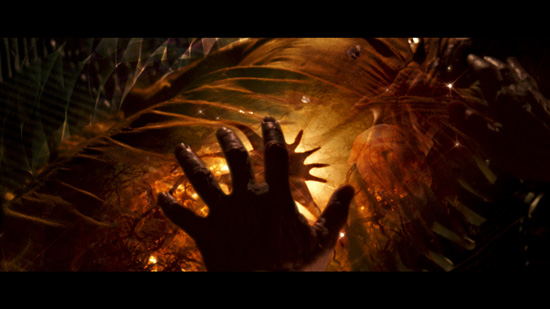Its odd to think that the sci-fi film is an English-language phenomenon. There are several notable exceptions such as Tarkovsky’s Solaris, Bekmambetov’s Night Watch and Wim Wenders’ unspeakably long Until the end of the World, but these are more often an auteur’s interpretation of the genre rather than genre films themselves. When foreign directors are entrusted with sci-fi franchises, like Guillermo del Toro doing Blade II, they usually end up playing by Hollywood’s rules. So what happens when foreign filmmakers maintain some cultural identity? Do the results translate both ways? In the case of these two recent films the results are very mixed.
Dante 01
Jeunet and Caro were once the inseparable filmmaking duo responsible for the distinctive masterpieces Delicatessen and City of Lost Children. Now that they’ve gone their separate ways, it’s interesting to see how their divergent interests combined to create their unique style. After the somewhat uncharacteristic Alien Resurrection, it became clear with Amelie and A Very Long Engagement that Jeunet was responsible for the whimsical (bordering on twee), romantic and vaudvillian aspects of their films. By process of elimination, that would make Caro the dystopian sci-fi geek with zero sense of humour.
Dante 01 confirms the suspicion that Caro might have been the sidekick in that dynamic duo. Now you’d think that if anyone is going to shake up the tired world of sci-fi its going to be a Frenchman. But in a very French way, Dante 01 acts as if it’s more profound and interesting than it is. The result is a film that wont satisfy sci-fi fans, francophiles or even fans of decent cinema. For starters, the film is shockingly similar in detail to Alien 3: A bunch of bald mental patients are in a remote penal colony where the people in charge, who work for some evil corporation, are subjecting them to a controlled ‘infection’ for research purposes (this time not aliens but some kind of nano bots) but luckily there is a messianic figure (not Sigourney Weaver but the Merilvingian from the Matrix) who can sacrifice themselves to save everyone. Oh, and did I mention that there’s a creature strikingly like the face hugger that lives in people’s chests!? There’s no way this is some coincidence whereby Caro is so high-brow that he’s never heard of David Fincher or the Alien films. His former partner directed a sequel for fuck’s sake! Granted, there’s a lot of cannibalism between sci-fi films but if you’re going to steal a premise then steal a better premise than that of Alien 3.

Now for the record, I happen to think that Alien 3 is a great film (just not as great at the previous two) but it’s good because of Fincher’s trademark cinematography and some strong performances, not because of its contrived plot. In Caro’s hands this standard, archetype-heavy story, seems even more predictable. The characters all have hilariously symbolic names which are liberally plucked from the Bible, Greek Mythology and History books (St. George, Lazerous, Ceaser, Buddha etc.) all of which kind of do what their names suggest. This is one step lazier than naming your characters using known Latin-roots e.g. – Necromonger. It’s like a particularly long and particularly bad episode of The Outer Limits or the 90s remake of the Twilight Zone.
It seems as if Caro’s plan was to disguise this highly unoriginal genre film as an arthouse piece by leaving lots of unanswered questions. The ending devolves into complete abstract nonsense but without the emotional climax you get from the arty ending of 2001: A Space Odyssey because the emotions haven’t been paid for in the first place. If you’re going to end a film that pretentiously you better make it 3 hours long to break the audience’s will first. In a way, the whole experience makes me wish that Jeunet and Caro would end this trial separation and get back together. Jeunet could dilute Caro’s seriousness and Caro can piss all over Jeunet’s optimism.
La Antena
La Antena, on the contrary, has in spades what made Jeunet and Caro’s early films so successful: charm. It is a retro-futurist fable but unlike the disappointing Sky Captain and the World of Tomorrow it mimics its target both in form and content. It references everything from Fritz Lang to film noir but is mostly a homage to the films of Melies. Even if you don’t know Melies first-hand, his films are such a part of our pop culture unconscious that you’ll understand the reference (think Smashing Pumpkins ‘Tonight, Tonight’ video and all the cardboard set pieces from The Mighty Boosh) The joy of this silent film era brand of surrealism is discovering the creative solutions and iconic images people can squeeze out of a stone-age special effects department. It challenges the audience to tap into their inner child and suspend your disbelief.
It should be said that this is probably a children’s film but the kind of film for children of Guardian readers who take their kids to films starring Buster Keaton as opposed to those of Sun reading parents who take their kids to films starring Hannah Montana. It’s also the kind of children’s film that reminds adults of what its like to be a kid.

The story takes place in a metropolis where no one has a voice and everyone must converse entirely in subtitles, which dance around the screen like characters themselves. When an evil businessman attempts to take aways these words as well, one man and his family try to stop him for good.
With all the apparent coded Franco overtones, you’d be forgiven for thinking this is a Spanish film but it’s in fact Argentinian. What is different in this take on the 1984-esque, man vs. totalitarian regime formula is that this time it is a modern day corporation generating the ‘new-speak’ (or in this case, ‘no-speak’). The very idea of a corporation stealing words is like a comparative literature professor’s wet dream. The symbolism is bold and effortless except for one ham-fisted image in which the evil corporation’s aerial is in the shape of a swastika and the protagonist’s aerial is a Jewish star. Seriously, unless you’re Adorno, equating fascism with advertising makes you sound like a hippie with cannabis psychosis.

There are numerous memorable images but my personal favorite is when they discover that the corporation is actually run by a girl wearing a colander, playing what looks like Dance, Dance Revolution in a snow globe. For better or for worse, the edginess of the film is blunted by the silent movie style acting which makes it a bit like Eraserhead-lite (which is certainly nothing to sniff at). We can only hope that this relatively unknown director makes more high quality films like this and doesn’t find himself making Blade IV or Alien 5.
Dante 01 and La Antenae are both out on DVD now.



